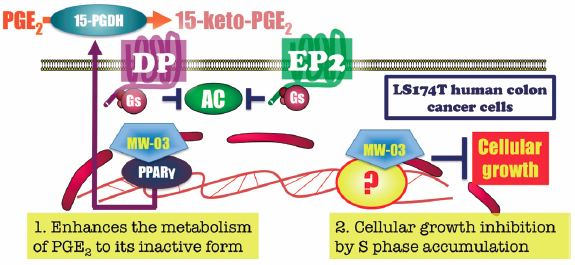- 著者
- Naofumi Seira Naoki Yanagisawa Akiko Suganami Takuya Honda Makiko Wasai John W. Regan Keijo Fukushima Naoto Yamaguchi Yutaka Tamura Takayoshi Arai Toshihiko Murayama Hiromichi Fujino
- 出版者
- The Pharmaceutical Society of Japan
- 雑誌
- Biological and Pharmaceutical Bulletin (ISSN:09186158)
- 巻号頁・発行日
- vol.40, no.10, pp.1806-1812, 2017-10-01 (Released:2017-10-01)
- 参考文献数
- 31
- 被引用文献数
- 3
Increases in the expression of prostaglandin E2 (PGE2) are widely known to be involved in aberrant growth in the early stage of colon cancer development. We herein demonstrated that the novel indole compound MW-03 reduced PGE2-induced cAMP formation by catalization to an inactive metabolite by inducing 15-hydroxyprostaglandin dehydrogenase through the activation of peroxisome proliferator-activated receptor-γ. MW-03 also inhibited colon cancer cell growth by arresting the cell cycle at the S phase. Although the target of MW-03 for cell cycle inhibition has not yet been identified, these dual anti-cancer effects of MW-03 itself and/or its leading compound(s) on colon cancer cells may reduce colon cancer development and, thus, have potential as a novel treatment for the early stage of this disease.
- 著者
- Natsuki Yamagiwa Haruka Kobayashi Haruka Okabayashi Miki Yasuda Keijo Fukushima Jun Kawamura Satoshi Kotoura Hiromichi Fujino
- 出版者
- The Pharmaceutical Society of Japan
- 雑誌
- Biological and Pharmaceutical Bulletin (ISSN:09186158)
- 巻号頁・発行日
- vol.45, no.5, pp.643-648, 2022-05-01 (Released:2022-05-01)
- 参考文献数
- 17
- 被引用文献数
- 2
Plasmalogens are a group of glycerophospholipids containing a vinyl-ether bond at the sn-1 position in the glycerol backbone. Cellular membrane plasmalogens are considered to have important roles in homeostasis as endogenous antioxidants, differentiation, and intracellular signal transduction pathways including neural transmission. Therefore, reduced levels of plasmalogens have been suggested to be associated with neurodegenerative diseases such as Alzheimer’s disease. Interestingly, although arachidonic acid is considered to be involved in learning and memory, it could be liberated and excessively activate neuronal activity to the excitotoxic levels seen in Alzheimer’s disease patients. Here, we examined the protective effects of several kinds of plasmalogens against cellular toxicity caused by arachidonic acid in human neuroblastoma SH-SY5Y cells. As a result, only phosphatidylcholine-plasmalogen-oleic acid (PC-PLS-18) showed protective effects against arachidonic acid-induced cytotoxicity based on the results of lactate dehydrogenase release and ATP depletion assays, as well as cellular morphological changes in SH-SY5Y cells. These results indicate that PC-PLS-18 protects against arachidonic acid-induced cytotoxicity, possibly via improving the stability of the cellular membrane in SH-SY5Y cells.

